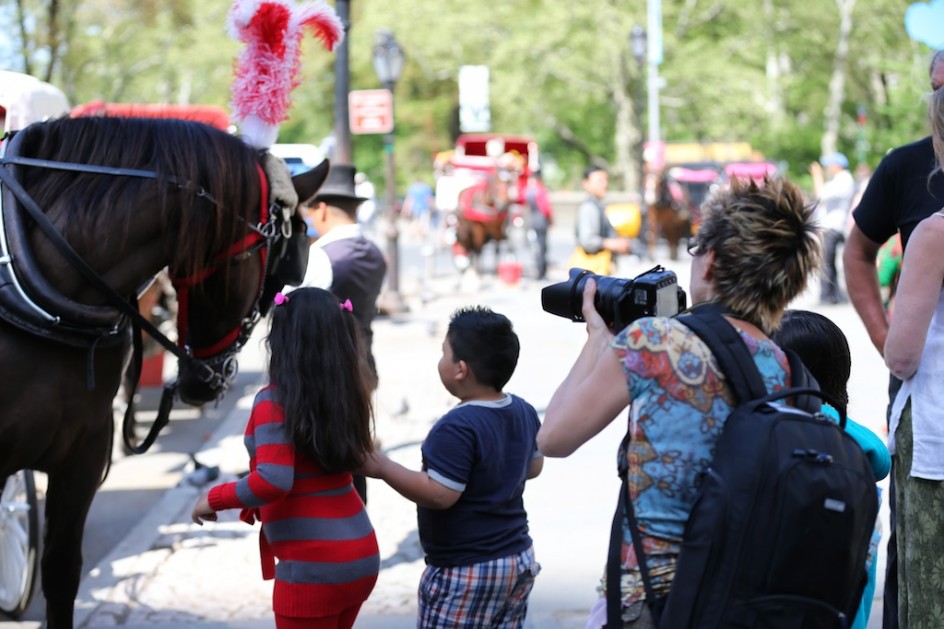
I got a letter in my Post Office Box (P.O.Box 205, Cambridge, N.Y., 12816) from Betty Tumlin of Eugene, Oregon, she has been reading the blog and told me she wanted to share a couple of thoughts that had been swirling around in her head the past couple of months. I am grateful that she did. Betty visited New York City the summer after the 9/11 attacks. She was attending a teachers convention at a hotel near Central Park.
While she was in New York, the official closing of the excavation site at the World Trade Center was announced.
“As the city went into another mourning period,” Betty wrote, “the only place I saw joy was with the carriage horses. Something about those wonderful creatures brought a smile to lots of faces and helped them forget the tragedy that had happened less than a year earlier.” She visited the usual tourist attractions, she said, but her fondest memory of the city are the carriage horses and their drivers. “I went on three rides while I was in New York City. Best trip memories of the Big Apple.”
Betty added that as a former 2nd grade teacher, she was appalled and “frankly disgusted” that the protesters were handing out information about the “mistreatment” of the horses to children. “Children have no place in this so-called debate. In my opinion, this is absolutely not OK.” Blessings from Oregon, she said, to Maria and me and the animals at the farm, she wrote.
I was glad that Betty mentioned “joy” in her letter to me. The mayor and the animal rights protesters never mention “joy” in their talks and writings about the carriage horses. There is no joy on the demonstrator’s faces or in their protests or in the pronouncements of the mayor. Like magic, it is hard to put a value on joy, on the hearts the horses have lifted, on the imaginations they have touched, on the smiles of children’s faces and the dreams of lovers in the great park.
The mayor of New York says it is not “humane” to have horses in New York City but I do not sense he really knows the meaning of the term. To be humane means to be characterized by tenderness and compassion, and sympathy for animals and people, especially for the suffering or distressed humane treatment of horses.
People like Betty and the children and the lovers have no voice in the carriage horse debate, the city is happy to take their tourist dollars but does not seem interested in their opinions. That is a shame. Their testimonies are, of course the most relevant and powerful, more than the angry city apartment dwellers shouting at the carriage horses. Betty spent her life in the classroom and when she rode the carriages, she did not see any suffering or mistreatment of horses. No one outside of the animal rights demonstrators seems to have either.
But she did see and feel joy. How much value should a city put on joy, one of the great gifts of the horses?
Joy is perhaps the most relevant feeling if you spend any time around the horses, their stables, the drivers and above all, the millions of Betty Tumlin’s who have ridden the carriages. Joy is the emotion of great delight or happiness caused by something exceptionally good or satisfying; keen pleasure, elation. Betty felt the joy of riding in a horse-drawn carriage.You can see it on the faces of almost everyone who rides in the carriages or touches the horses.
It seems that they are trying to take the joy out of New York and Central Park. I do not believe Betty Tumlin would have found much joy in a vintage electric car humming it’s way through the park. I do not think she would call a car a “wonderful creature.” I do not think a car – even an eco-friendly, cruelty-free one – would have lifted any hearts that awful summer. Thank you, Betty, for existing in our world and reminding us that if the horses leave, so much joy will perish with them.
The mayor and the animal rights groups in New York have erred in a number of ways, but their most spectacular mistake, I think, has been to talk only with one another, exchanged some money and self- righteousness. Thus, they never noticed that hardly anyone in the rest of the world – the residents, workers, street people, businessmen and women, editorial writers, tourists and visitors, lovers and romantics, animal lovers and office workers – has always seen something else in the horses.
Blessings back to you, Betty, for your chronicle of joy.
